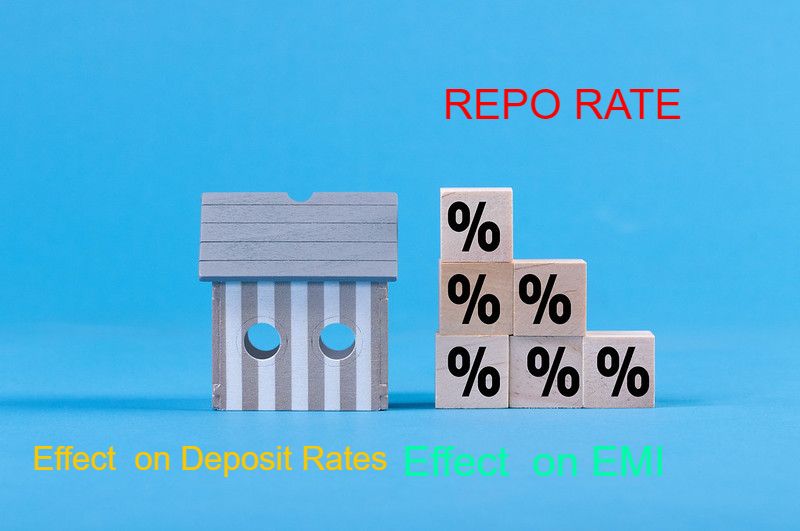WHAT IS REPO RATE ?

FOR LATEST NEWS ON REPO RATE , CLICK HERE
WHAT IS REPO RATE AND REVERSE REPO RATE ?
The rate at which the Reserve Bank of India lends money to commercial banks in the event of shortfall of funds is known as Repo rate . Reverse Repo Rate is the rate at which RBI borrows money from commercial banks .
. Reserve Bank of India as a banker to bankers would extend this facility to provide funds to the banks in case of short of liquidity in the market and borrow the funds in case of surplus liquid funds with the banks . Increase / decrease of the rates by RBI has implications to the commercial banks as their borrowing cost goes up or otherwise . In turn as banks generally pass on such costs to the customers , ultimate cost of borrowing from the banks to the general public will be affected . But banks need not automatically change the rates in case of change of Repo rates .
Reserve Bank of India is concerned about the money supply and its effect on inflation . Hence RBI in its effort to control inflation tries to control the rate at which funds available to the banks Hence it increases or decreases its repo rates to reduce or increase the availability of funds to the market . Inflation going up means that there is more money supply to the availability of goods / services and hence going up of prices of commodities . Reduction of implies reduction of money available to the market for purchase of commodities .
Earlier the governor of RBI was deciding on the REPO Rates . Now with signing of a memorandum with Central Government , RBI has agreed to target inflation with in an accepted band . Hence it has taken responsibility to take action to keep inflation within a desired band of 2 % to 6% .
Monetary policy committee of reserve Bank of India tweaks Repo rates during their bimonthly meetings
Monetary policy Committee of RBI :
The Monetary Policy Committee of Reserve Bank of India is responsible for fixing Repo and other benchmark interest rates in India. The meetings of the Monetary Policy Committee ( MPC ) are held at least 4 times a year (specifically, at least once BIMONTHLY) and it publishes its decisions after each such meeting.
The committee has six members – three members from the Reserve Bank of India and three external members nominated by the Government of India. The members are to keep the deliberations secret atleast for a “silent period” seven days before and after the rate decision for “utmost confidentiality”. The Governor of Reserve Bank of India is the chairperson of the committee. Decisions are taken by majority with the Governor having the casting vote in case of a tie.
The current mandate of the committee is to maintain 4% annual inflation with an upper tolerance of 6% and a lower tolerance of 2%.[
IMPLICATION OF REPO RATE CUT / HIKE :
1. Banks will reduce their interest rates as they have access to a cheaper fund from RBI ,if Repo Rate is cut . Interest rates at which banks lend will go up , if Repo Rate is hiked . Hence borrowers of banks will be benefited with lesser interest burden / increased interest burden . In case of Repo rate lowering , Corporates. traders who have borrowed will have lesser interest burden and hence their profitability will improve .
2. As loans from banks will become cheaper or costlier as per Repo rate movement , borrowing from banks will become attractive or expensive especially for housing loans and vehicle loans .
3. As banks reduce or increase interest , existing borrowers will pay less or more EMI in case of housing loan and vehicle loans . It will be beneficial for middle class borrowers or adverse in case of hike . Some loans may be directly linked to prevailing Repo rate and hence may automatically change according to Repo movement .
4. As bankers need to pay lesser or higher interest on their borrowing , profitability will improve or otherwise. Stock prices can go up or come down in anticipation of higher / lower profit .
6. As interest burden of corporates will come down or go up , profits can go up or come down . Hence in anticipation , their stock prices go up or come down .
7. Interest rates on deposits can come down or goes up as Repo rate movement . and it will have adverse or beneficial effect on those who are dependent up on such income . Especially retirees depending up on interest income will be affected . 8 As inflation depends up on various factors like vagaries of weather , international supply or demand , government policies , change in Repo rate done in isolation may have very little effect on commodity prices . Hence change in Repo rate may not have any desired effect .
9. REPO RATE LINKED INSTRUMENTS : Interest rates on some deposits and loans are directly linked to the prevailing Repo rates and hence automatically move according to the movement of Repo rates . Some such instruments are
Repo Rate linked Lending rates ( RRLL ) : Many borrowers would have taken car loans / home loans with RRLL interest rates . Hence hike in repo will automatically move up borrowing cost . You can check whether your loans are directly linked to Repo rates or not by going through the loan agreement .
Repo Rate linked Deposits rates : Some banks have linked their deposit rates directly to prevailing Repo Rates . For example , SBI has linked Savings Bank interest rates to Repo Rate .
10 . With increase in deposit rates , savings will be promoted while borrowings will be reduced to avoid interest burden . Thus less money will be available in the market and liquidity will be affected . With tighter money conditions , demand will be affected and It is expected to have adverse effect on the liquidity of the system .

DISCLAIMER
Use of the information at this site www.plannprogress.com is at one’s own risk. We do not offer to sell or solicit to buy any financial instruments including Deposits , Loans whether short term or otherwise , Mortgages , Stocks , Insurance or Mutual Funds .This site does not offer to sell or solicitation to buy any securities and we will not be liable for any losses incurred or investment(s) made or decisions taken/or not taken based on the information provided herein. Information contained herein are purely for educational purposes and does not constitute a personal recommendation or take into account the particular investment objectives, financial situations, or needs of individual investors. Before acting on any recommendation, investors should consider whether it is suitable for their particular circumstances and, if necessary, seek an independent professional advice.
Entry to this site is free of charge and we do not charge any fees what so ever . No need for registration for viewing the site . All content and information is provided on an ‘As Is’ basis by us. Information herein is believed to be reliable, but does not warrant its completeness or accuracy and expressly disclaims all warranties and conditions of any kind, whether express or implied. As a condition to accessing http://www.plannprogress.com content and website, you agree to our Terms and Conditions of Use, Privacy policy & Disclaimer available on the links . The performance data quoted represents past performance and does not guarantee future results.
Articles/ Pages in this site contain advertisements and links to various third party sites / blogs as we have found articles therein interesting and useful and we believe reliable . Those links sites and advertisements may contain offer of sales or services of various kinds including financial services . We accept no responsibility for the accuracy , correctness and/or completeness of any information contained therein as we have not independently verified. The links and third party advertisements are governed by the privacy policy of those third party sites / blogs. We do not warrant or guarantee for any services or sales utilized therein . This site expressly disclaims all warranties and conditions of any kind, whether express or implied. However readers are advised to exercise their discretion in utilising / following any advice contained therein or utilizing any services or accepting their sales or any other offers and we do not take any responsibility what so ever.
The site is governed by Indian Laws and comes within the jurisdiction of courts in Mysuru , Karnataka , India
Contact Information : The site www.plannprogress.com is owned and operated by Mr . Manjunathan B.N. , No 37, 5thBlock , Madhuvana Layout , Sriramapura 2nd stage , Mysuru 570023 , Karnataka , India and can be contacted at email : info@plannprogress.com
Copyright © PlannProgress – All Rights are Reserved | Powered by PixelFlare
This website uses cookies to provide necessary site functionality and to improve your experience. By using this website, you agree to our use of cookies.





